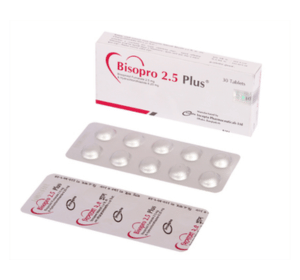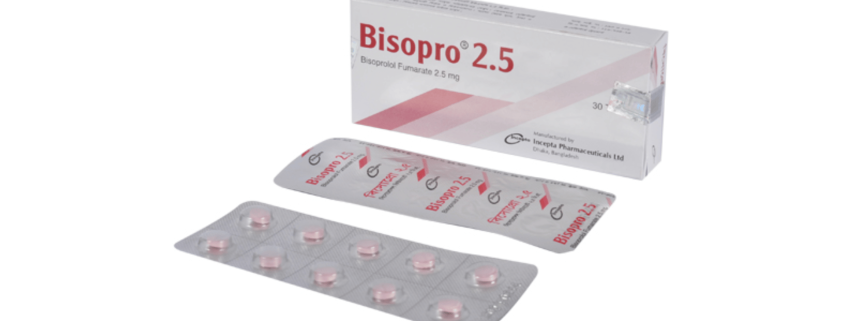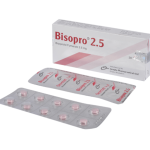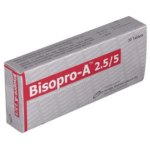Bisopro Plus(Bisoprolol fumarate + Hydrochlorothiazide)

Therapeutic Group: Cardiovascular
Presentation
Bisopro 2.5 Plus: Each tablet contains Bisoprolol fumarate USP 2.5 mg and Hydrochlorothiazide BP 6.25 mg
Bisopro 5 Plus: Each tablet contains Bisoprolol fumarate USP 5 mg and Hydrochlorothiazide BP 6.25 mg
Description
Bisoprolol is a beta1 selective (cardio selective) adrenoceptor blocking agent without significant membrane stabilizing activity or intrinsic sympathomimetic activity in its therapeutic dosage range.
Hydrochlorothiazide is a diuretic (benzothiadiazine) affecting the distal renal tubular mechanism increase excretion of sodium and chloride and resulting reduced blood volume or Cardiac output.
Individually Bisoprolol Fumarate and Hydrochlorothiazide used as antihypertensive agent and combination of these two drugs brings maximum response in treatment of hypertension. Hydrochlorothiazide significantly increases the antihypertensive effect of Bisoprolol Fumarate. The incidence of hypokalemia is less due to low dose of Hydrochlorothiazide.
Indications
Bisoprolol plus Hydrochlorothiazide is indicated in the treatment of Hypertension.
Dosage & Administration
Bisoprolol is an effective treatment of hypertension in once-daily doses of 2.5 mg to 40 mg, while hydrochlorothiazide is effective in doses of 12.5 mg to 50 mg. In clinical trials of bisoprolol/hydrochlorothiazide combination therapy using bisoprolol doses of 2.5 mg to 20 mg and hydrochlorothiazide doses of 6.25 mg to 25 mg.
Side Effects
Generally well tolerated. Most side effects have been mild and transient. Normally fatigue, dizziness, headache, bradycardia, arrhythmia, peripheral ischemia, chest pain, palpitations, rhythm disturbances, cold extremities, claudication, orthostatic hypotension, diarrhoea, constipation, nausea, dyspepsia, rhinitis, pharyngitis etc. may occur.
Precautions
Dryness of mouth, thirst, weakness, lethargy, drowsiness, restlessness, muscle pains or cramps, muscular fatigue, hypotension, oliguria, tachycardia, and gastrointestinal disturbances are potential syndrome of fluid and electrolyte imbalance.
Dilutional hyponatremia may occur in edematous patients in hot weather; appropriate therapy is water restriction rather than salt administration.
Hyperuricemia or acute gout may be precipitated in certain patients receiving thiazide diuretics. Bisoprolol fumarate, alone or in combination with hydrochlorothiazide, has been associated with increases in uric acid.
Use in Pregnancy & Lactation
Use in special population:
Nursing Mothers: Thiazides are excreted in human breast milk. Small amounts of bisoprolol fumarate (< 2% of the dose) have been detected in the milk of lactating rats. Because of the potential for serious adverse reactions in nursing infants, a decision should be made whether to discontinue nursing or to discontinue the drug, taking into account the importance of the drug to the mother.
Use in Pregnancy: Pregnancy Category C.
Geriatric Use: No overall differences in effectiveness or safety were observed between these patients and younger patients. Other reported clinical experience has not identified differences in responses between the elderly and younger patients, but greater sensitivity of some older individuals cannot be ruled out.
Drug Interaction
Bisoprolol should not be combined with other beta-blocking agents. Patients receiving catecholamine-depleting drugs should be closely monitored, because the added beta-adrenergic blocking action of Bisoprolol may produce excessive reduction of sympathetic activity. In patients receiving concurrent therapy with clonidine, if therapy is to be discontinued, it is suggested that Bisoprolol be discontinued for several days before the withdrawal of clonidine. Bisoprolol should be used with care when myocardial depressants or inhibitors of AV conduction, such as certain calcium antagonists or antiarrhythmic agents are used concurrently. Concomitant use with digitalis glycosides can increase the risk of bradycardia. Concurrent use of rifampin increases the metabolic clearance of Bisoprolol, resulting in a shortened elimination half-life of Bisoprolol. However, initial dose modification is generally not necessary.
Over Dose
There are limited data on overdose with bisoprolol fumarate and hydrochlorothiazide. The most frequently observed signs expected with overdosage of a beta-blocker are bradycardia and hypotension. Lethargy is also common, and with severe overdoses, delirium, coma, convulsions, and respiratory arrest have been reported to occur. Congestive heart failure, bronchospasm, and hypoglycemia may occur.
Storage
Store in a cool and dry place, protected from light.
Commercial Pack
Bisopro 2.5 Plus : Each box contain 3 blister strips of 10 tablet.
Bisopro 5 Plus : Each box contain 3 blister strips of 10 tablet.



